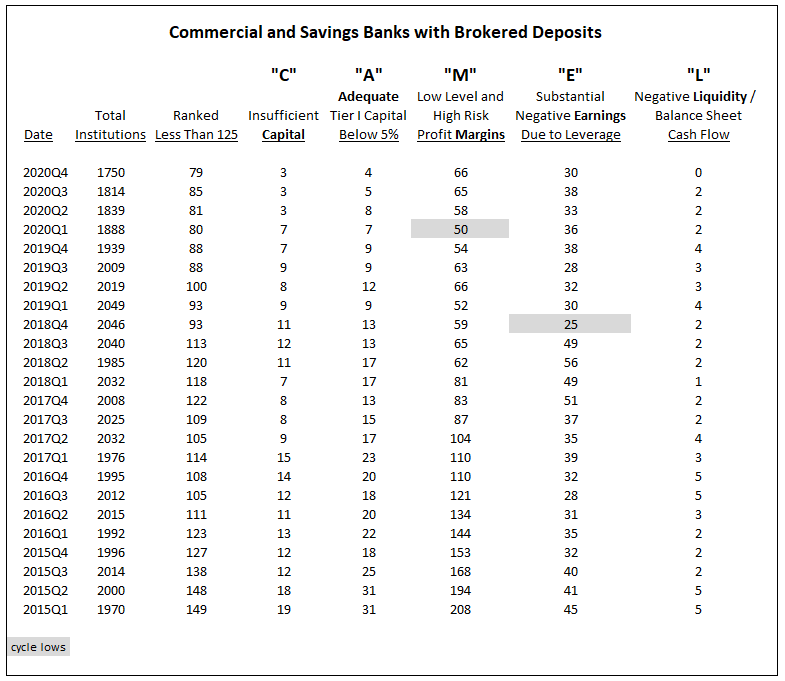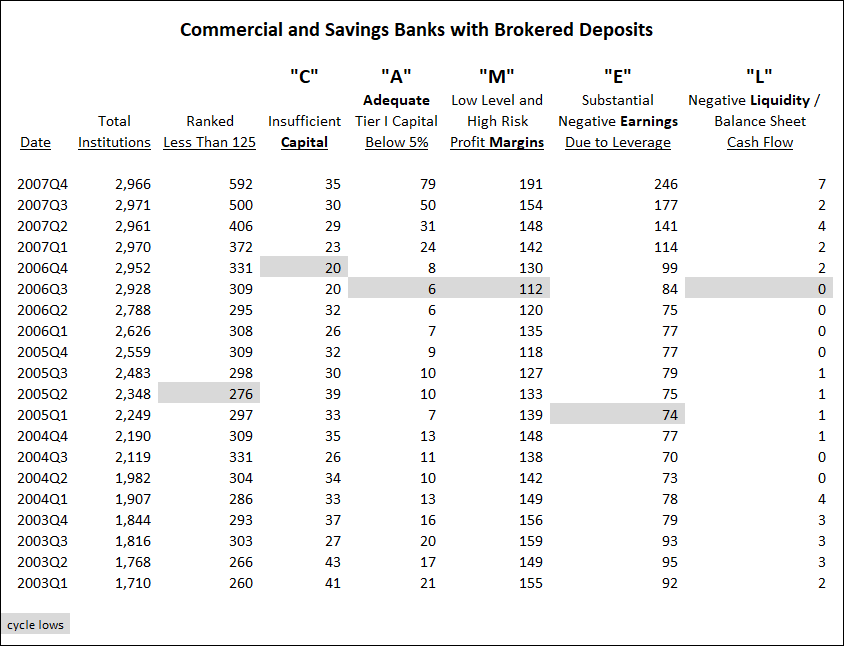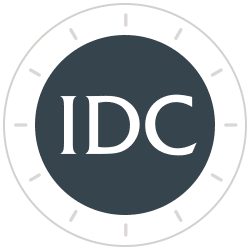Evaluating Banking Risk with IDCFP’s CAMEL Analysis of 2020Q4
The Components of CAMEL
Out of the 1,750 institutions with brokered deposits, we have identified 79 ranked less than 125 in the fourth quarter of 2020, down from 85 the previous quarter. When we see the number of these poorly rated banks reach a low and begin to rise, both in the total institutions ranked and by CAMEL component, this indicates the potential for a future crisis.
Under our CAMEL analysis, the total institutions ranked less than 125, or below investment grade, reached a low of 80 in 2020Q1 and increased to 85 in 2020Q3, but declined to 79 in 2020Q4. Similarly, in 2020Q4, institutions with adequate Tier 1 capital below 5%, as well as those with substantial negative earnings and negative liquidity all continued to decline in 2020Q4 (see Table I). Those with insufficient capital remained at 3. Only institutions with low level and high-risk margins reached a previous low in 2020Q1 and increased in 2020Q4 to 66. All of this indicates little potential risk. The true level of risk will be determined following continued economic resolution from the recession caused by Covid-19.
Covid-19 and a second quarter 2020 short-term recession created potential risk in the banking system. Reports on bank financial conditions for 2021Q1 to be released in May will further detail this risk. Subscribe to IDC Financial Publishing’s online portal to receive updates.
A Specific Category of Banks Creates a Superior Forecast
At IDC Financial Publishing, (IDCFP), we focus on commercial and savings banks with brokered deposits as the best indicator of risk in the banking industry. Historically, institutions with brokered deposits* held the vast majority of assets in the banking system. This was the case in the years prior to the 2008-2009 banking crisis and remains the case today. This universe of banks is the best for statistical analysis and measure of potential financial crisis because of these characteristics:
- Control 81% of all bank assets.
- High loan and deposit growth.
- Require brokered deposits over and above their core deposits.
*Brokered deposits exclude reciprocal deposits in this analysis due to changes in reporting requirements on reciprocals that distort history.
Table I

The Warning Signs Before a Financial Crisis
At-risk banks with brokered deposits began to rise in 2005. The number of banks with brokered deposits ranked less than 125 by IDCFP, or below investment grade, reached its low of 276 in the second quarter of 2005, then rose above that level, accelerating in 2007. This rise in banks ranked below investment grade by IDCFP signaled the financial crisis with a 3-year lead time (see Table II).
Rise in at-risk banks with brokered deposits under each component of the CAMEL* rank also began in 2005. Table II shows how each component of IDCFP’s CAMEL ranks reached cycle lows in the number of institutions ranked under 125 and subsequently rose to higher numbers well in advance of the financial crisis (see Table II).
- The earliest warning came from the E in CAMEL falling to 74 in the first quarter of 2005.
- In the third quarter of 2006, the A, M and L also reached lows.
- In the fourth quarter of 2006, the C in CAMEL reached its low 18 months before the financial crisis.
After reaching lows in number of at-risk banks, note that both the number of total banks and components of CAMEL subsequently accelerated through 2007.
Table II

As seen in history, the increase in the number of financial institutions with an IDCFP CAMEL rating below 125, or below investment grade, forecast the bank financial crisis a few years later. Our ranks are critical for investors to monitor financial institutions and prepare for potential risk.
To view all our products and services please visit our website www.idcfp.com.
For more information about our Deposit Database, or for a copy of this article, please contact us at 800-525-5457 or info@idcfp.com.
John E Rickmeier, CFA, President, jer@idcfp.com
Robin Rickmeier, Marketing Director
